Best For | Bloggers, large websites, and advanced customization with plugins and coding flexibility. | Beginners, small businesses, and entrepreneurs need an easy drag-and-drop website with funnels. |
Price | Starts from $4 | Starts from $12 |
Free Plan/Free Trial | Free Plan | 14 Days Free Trial |
Features | Open-source platform | Drag-and-drop builder |
Pros | Highly flexible customization | User-friendly interface |
Cons | Steep learning curve | Limited advanced features |
When building a website, choosing the right platform can feel overwhelming. WordPress and Simvoly are two popular options, but they work in very different ways.
I’ve used both, and here’s what I’ve learned: WordPress offers extensive control and flexibility, but it has a significant learning curve. You’ll need to set up hosting and manage updates.
On the other hand, Simvoly is an all-in-one builder that’s much easier to use, especially for beginners or businesses that want a simple drag-and-drop experience.
So, which one is better for you? It depends on what you need! If you want complete customization, WordPress might be best. If you prefer a fast and easy setup, Simvoly could be the way to go.
Let’s break it down so you can decide!
Overview: WordPress vs Simvoly
About WordPress:

WordPress is a free, open-source content management system (CMS) for building websites. WordPress is a content management system (CMS) created in PHP that utilizes a MySQL database on a more technical level.
WordPress is the most user-friendly and powerful platform for blogging and website building available today.
WordPress is an excellent platform for a diverse range of websites. WordPress is a flexible CMS that can be used for everything from blogging to e-commerce to business and portfolio websites.
WordPress is an excellent choice for both large and small websites, as it was designed with usability and flexibility in mind.
About Simvoly:

Simvoly is a website builder that also allows you to design sales funnels. It is a quick and simple website and funnel designer that allows users to realize their dream of owning a website for themselves or their business without prior IT skills.
This enables non-technologists to establish an online presence, in addition to their social networking platforms, without the assistance of web developers or designers.
Simvoly offers a wide range of customizable themes and layouts, along with a drag-and-drop interface and widget blocks. Simvoly is a website creation application that is seen as an ideal solution for non-IT people to develop a website in flash.
Features Comparison: WordPress vs Simvoly
1. Ease of Use
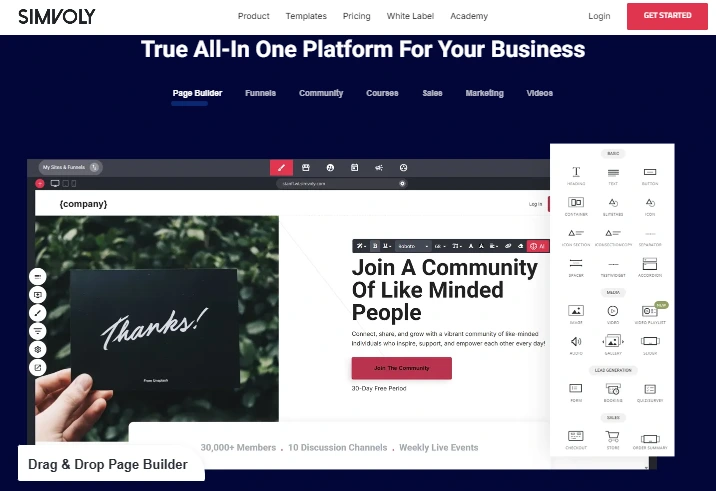
Simvoly is like using a super intuitive drag-and-drop tool. You don’t need to think about coding, hosting, or anything technical. You literally pick a template, move stuff around, and boom—you have a website. It’s like playing with Lego blocks.
WordPress, on the other hand, has a learning curve. If you use WordPress.org (the real deal), you’ll have to set up hosting, install themes, deal with plugins, and sometimes touch a little code. WordPress.com (the simpler, hosted version) makes it easier, but still not as “drag-and-drop” as Simvoly.
If you want something quick, simple, and stress-free—Simvoly wins. But if you’re okay with some learning, WordPress gives you more control.
2. Customization & Flexibility

If you’re the type who wants to tweak everything, WordPress is the king. You can install plugins, edit the design, and even hire a developer to make crazy customizations.
With Simvoly, you’re mostly limited to what their builder allows. Sure, you can tweak colors, fonts, and layout, but you won’t have the same deep control as WordPress.
So, if you’re picky about design or need custom features, WordPress is the better choice.
3. E-Commerce & Funnels
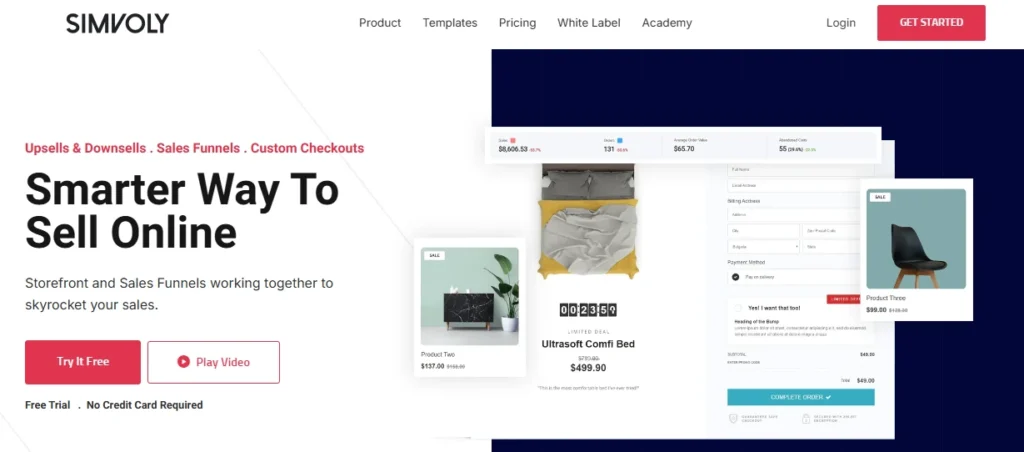
Now, this is where Simvoly shines! If you’re into selling products online, they have built-in sales funnels (like ClickFunnels but cheaper), which makes it super easy to guide people from clicking on your site to actually making a purchase.
WordPress can do e-commerce, but you’ll need WooCommerce (a plugin) to make it work, and setting it up isn’t as smooth as Simvoly. That said, WordPress + WooCommerce is more powerful and flexible in the long run.
If you’re looking for quick, hassle-free online sales, Simvoly is a better option. But if you’re building a large, scalable store, WordPress + WooCommerce is the way to go.
4. Blogging & Content
If you’re planning to write blogs or create lots of content, WordPress destroys Simvoly—no competition. WordPress was designed for blogging, so it offers better SEO (search engine optimization), more effective tools for organizing content, and greater customization options.
Simvoly has basic blogging features, but they’re not as strong. If you’re serious about blogging, go with WordPress.
5. Speed & Performance
Since Simvoly is a hosted platform, they handle all the speed and performance optimizations for you. The pages load fast, and you don’t have to tweak anything.
With WordPress, performance depends on your hosting. A cheap hosting plan can make your site slow, and you may need to use caching plugins or consider a more reliable hosting provider to keep things running smoothly.
6. Support
Simvoly offers dedicated support, meaning that if you encounter issues, you can reach out to their team directly via chat or email. This is a significant advantage if you require hands-on assistance.
With WordPress, support depends on where you host your site. Some hosting companies offer great support, while others don’t. Since WordPress is open-source, most of the help comes from online forums, YouTube tutorials, and third-party providers.
If you want priority, hands-on support, Simvoly wins here. But if you don’t mind Googling fixes or hiring a developer, WordPress is fine.
Pricing: WordPress vs Simvoly
WordPress Pricing
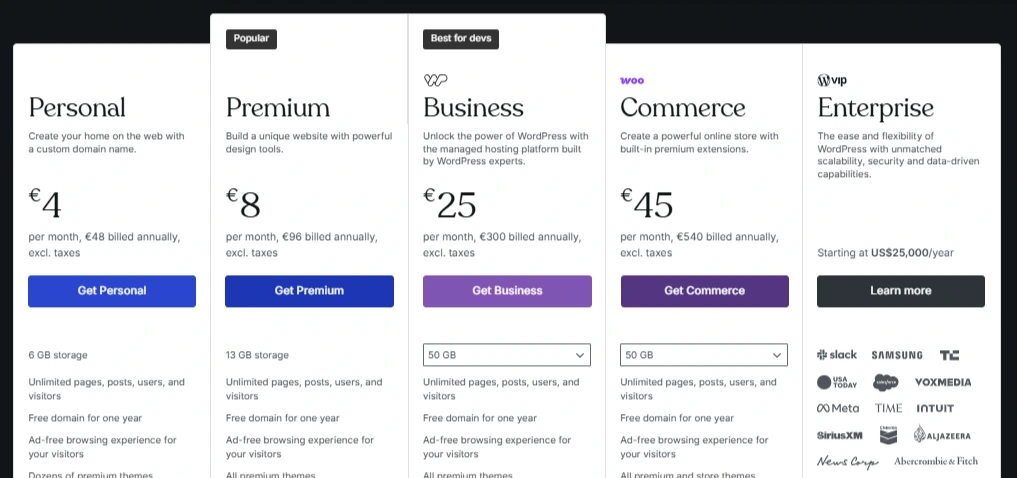
WordPress has two main options: WordPress.com and WordPress.org. They work differently and cost different amounts.
WordPress.com Pricing:
WordPress.com gives you plans for different needs:
- Free Plan: Simple features, uses a WordPress.com web address.
- Personal Plan: About $4/month if paid yearly.
- Premium Plan: Around $8/month, paid yearly.
- Business Plan: About $25/month, paid yearly.
- eCommerce Plan: Around $45/month, paid yearly.
These plans include hosting, a domain name, security, and help from support. Sometimes, there are discounts—like a recent sale with 25% off yearly plans.
WordPress.org Costs:
With WordPress.org, you set up everything yourself. Here’s what you’ll pay for:
- Domain Name: Usually $10–$20 per year.
- Web Hosting: Depends on what you choose:
- Shared Hosting: Starts at about $2.95/month.
- Managed WordPress Hosting: Costs $20–$60/month.
- Themes and Plugins: Some are free, but paid themes might be $50–$150, and paid plugins can cost $20–$200 per year.
There’s also a unique option from WordPress.com: a 100-year plan for $38,000, perfect for people wanting something long-lasting.
Choosing Between Them:
Pick WordPress.com or WordPress.org based on what you need, how comfortable you are with tech, and how much you want to spend.
Simvoly Pricing
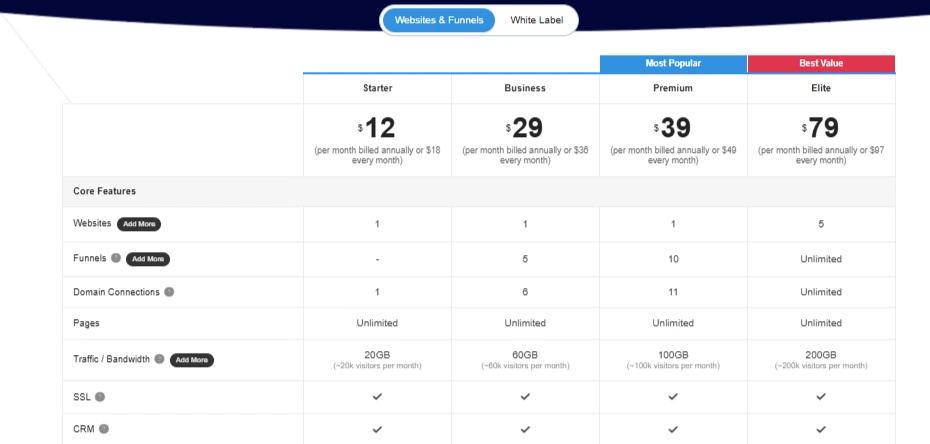
Simvoly offers four pricing plans to suit different business needs:
- Starter – $12/month (annually) or $18/monthly: Includes 1 website, 20GB bandwidth (~20k visitors), basic CRM, quizzes, and 5 video uploads.
- Business – $29/month (annually) or $36/monthly: Adds funnels (5), domain connections (6), e-commerce with 100 products, and 5 videos. No transaction fees.
- Premium (Most Popular) – $39/month (annually) or $49/monthly: Includes advanced funnel features, 10 funnels, 1,000 subscribers, 20 videos (1h each), and full e-commerce tools.
- Elite (Best Value) – $79/month (annually) or $97/monthly: Offers unlimited funnels, 5 websites, 2,500 subscribers, 50 videos (3h each), 200GB bandwidth, and top-tier community tools.
All plans include unlimited pages, SSL, CRM, AI assistant, live chat, and appointment booking features.
Security
WordPress
WordPress does, in fact, provide SSL security. Additional information on WordPress website security can be found on their customer service page. You can also check their homepage to see if WordPress has updated its website security information.
Simvoly
Simvoly does, in fact, provide SSL security. For more information on Simvoly’s website security, please visit their customer support page. You can also check their homepage to see if Simvoly has updated its website security information.
App Integration Options
WordPress
In comparison to other website-building tools, WordPress offers a wide range of app integration options.
WordPress.com allows third-party integration with a variety of applications, with Google Analytics and GSuite being particularly popular. As far as I can tell, WordPress and Google are working together.
When you add plugins to the mix, things get crazy, because there are WordPress plugins for practically any service that has an API. If you wish to allow users to sign up for your newsletter directly from your website, you can also get a free integration with Mailchimp.
According to one reviewer on pcmag.com, WordPress outperforms its competitors in terms of app integration options. The full review can be found here.
WordPress.com began as a blogging platform, and it still has blog community features, but it now handles most website building needs, including commerce, social integrations, and mobile presentation.
Visit the company’s website for more information.
Simvoly
In comparison to other website builder tools, Simvoly excels in terms of app integration options.
Simvoly was rated as fairly average for app integration options in comparison to competing website builder services.
Few integrations – There aren’t many special tools or third-party integrations beyond the Big Three features.
A Google Maps-based map, Google Analytics, video links to YouTube and Vimeo, a photo gallery and slider, and social media links are all included.
Unfortunately, no shipping service integration is available. Payment processors such as Stripe and PayPal are available.
According to one reviewer, Simvoly outperforms its competitors in terms of app integration options.
Simvoly has recently added email marketing integration with GetResponse and ActiveCampaign, both of which are rated Excellent with four out of five stars. A Mailchimp app is also available for use with the service.
Visit the company’s website for more information.
Customer Service
WordPress
In comparison to other website builder tools, WordPress provides excellent customer service.
Actual interactions with customer service agents to see how good the support is, which you won’t find in many WordPress.com reviews. That’s exactly what I wanted to see, and I was pleasantly surprised.
However, before we delve into the details, several support options are available on WordPress.com. A comprehensive knowledge base, featuring articles and video tutorials, is available to all users, including those on the free plan.
If you can’t find what you’re looking for, check out the support forum. Every plan above the Blogger plan includes email support, and every plan above that includes 24/7 support.
Only community support is available on free WordPress.com sites, whereas paid accounts get email and chat support 24 hours a day, Monday through Friday.
Visit the company’s website for more information.
Simvoly
Simvoly may benefit from an FAQ page. Simvoly already has a “Beginner’s Guide” to building a website, as well as a blog where feature explainers are provided on occasion.
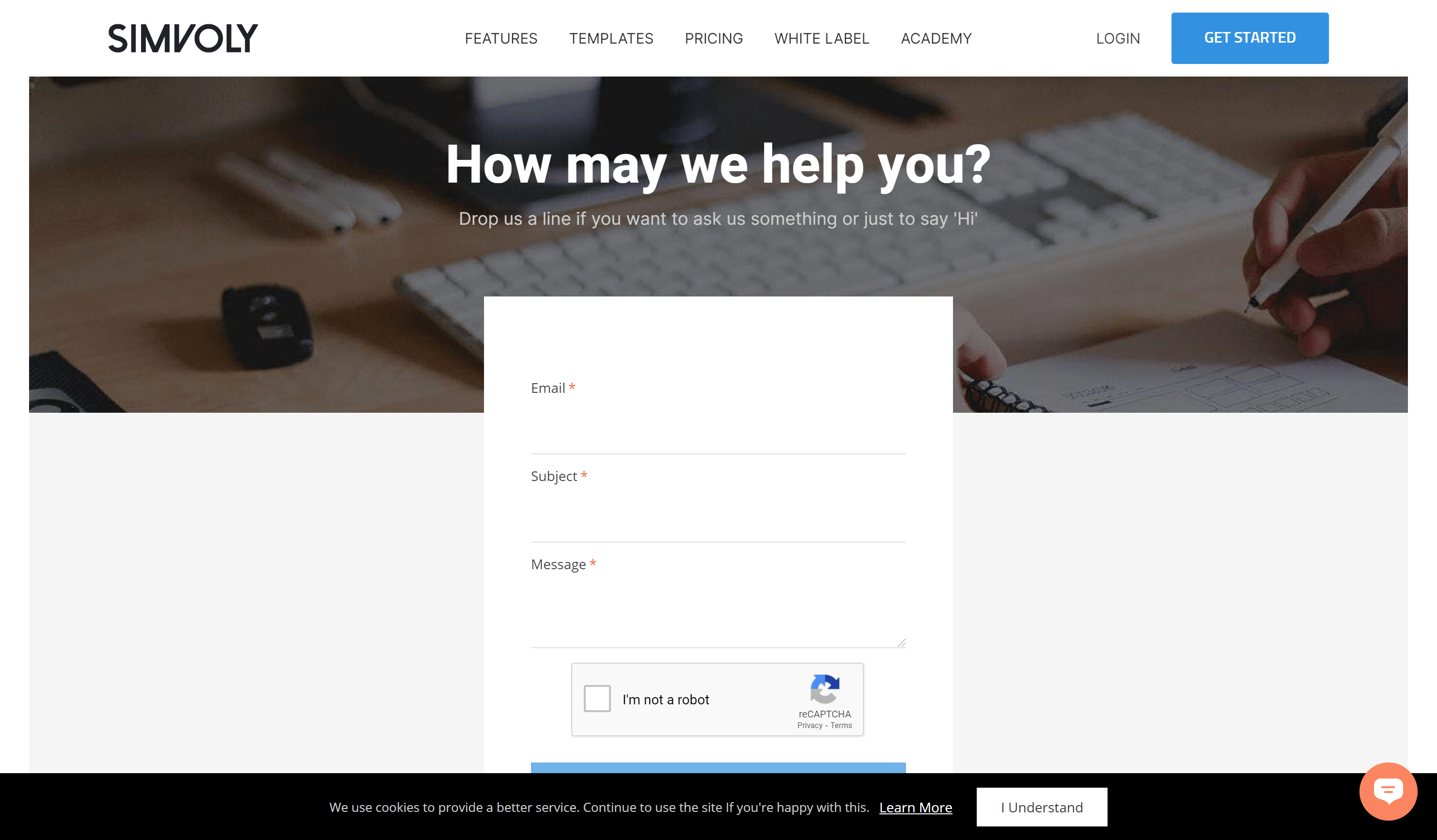
However, you can’t truly search the blog for information on a certain topic – the most you can do is click on a tag and see what comes up. Simvoly offers live chat and a contact form for direct support. When I used the live chat feature, my question was answered almost promptly.
I had expected more from Simvoly than its basic customer assistance. It’s great that live chat is available, but that’s the only other option for contacting support, aside from using a contact form.
The support team responded quickly via email; however, it would have been ideal if there were a phone number to contact for urgent assistance. The extensive knowledge base is a bonus because it makes it simple to learn everything there is to know about Simvoly’s various features.
If you have any queries concerning site construction using the service, a question mark button will always appear in the lower right corner of the site builder.
This button will lead you to a comprehensive help library that includes visual walkthroughs of site-building techniques. Simvoly will prompt you to contact the support staff via chat or email if you reach a dead end in those resources.
WordPress Pros & Cons
Pros
- Highly customizable with thousands of plugins.
- Open-source with a large community of developers.
- Great for blogging and content management.
- Flexible themes and design options.
- Robust SEO features with plugins like Yoast.
Cons
- Requires regular updates and maintenance.
- Can become slow with too many plugins.
Simvoly Pros & Cons
Pros
- Simple drag-and-drop builder for easy setup.
- Built-in CRM and marketing automation tools.
- No transaction fees on e-commerce plans.
- Affordable pricing with a 14-day free trial.
- Includes sales funnel and membership features.
Cons
- Limited third-party app integrations.
- Fewer customization options compared to other builders.
Simvoly Customer Reviews
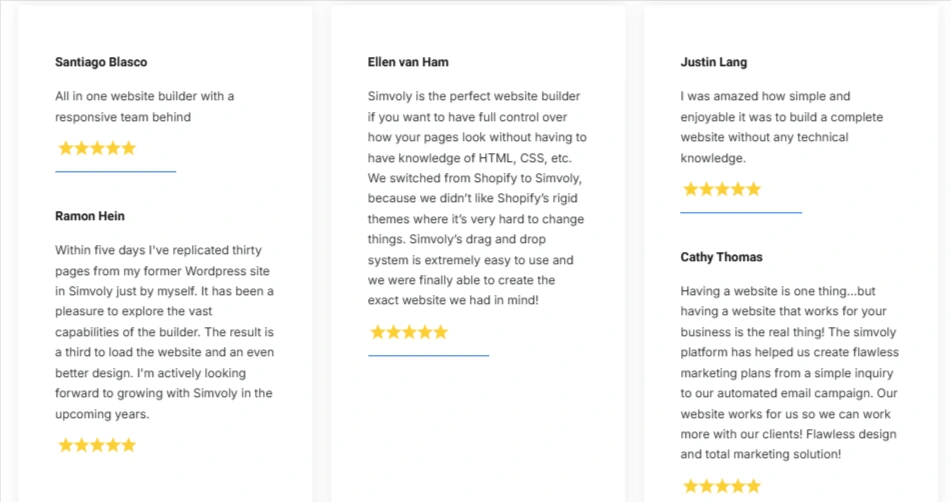
Santiago Blasco
All in one website builder with a responsive team behind

Ellen van Ham
Simvoly is the perfect website builder if you want to have full control over how your pages look without having to have knowledge of HTML, CSS, etc. We switched from Shopify to Simvoly, because we didn’t like Shopify’s rigid themes where it’s very hard to change things. Simvoly’s drag and drop system is extremely easy to use and we were finally able to create the exact website we had in mind!

Olejuru Lanfear
Moved from WordPress to Simvoly and have not regretted it. I no longer have to deal with plugins or theme updates. The Simvoly team are very responsive when questions are asked and is constantly working on providing the best platform on the market.

Cellus Christie
Extremely simple to use for non-tech people, amazing support too Stan has always been helpful

Customer Review- WordPress

FAQs on WordPress vs Simvoly
Which is easier to use, WordPress or Simvoly?
Simvoly is much easier to use. It’s a drag-and-drop builder with a simple interface, so you don’t need any technical skills. WordPress has a learning curve, especially when dealing with hosting, plugins, and customization.
Can I create an online store with both platforms?
Yes! Simvoly has a built-in eCommerce system that’s easy to set up, while WordPress relies on WooCommerce for online stores. WordPress offers more flexibility, but it requires more setup and maintenance.
Which platform is better for blogging?
WordPress is the best for blogging. It has better SEO tools, a more powerful editor, and full control over content. Simvoly allows blogging, but it’s limited in customization and SEO settings.
Does Simvoly offer more customization than WordPress?
No, WordPress is the clear winner in customization. With thousands of themes and plugins, you can build anything. Simvoly offers simple customization within its drag-and-drop builder, but you can’t tweak things at an advanced level.
Which one is faster in terms of website performance?
Simvoly is generally faster because it’s a fully hosted platform with optimized servers. WordPress performance depends on your hosting provider and plugins, so speed varies.
Is Simvoly better for building funnels?
Yes, Simvoly is built for funnels. It has built-in sales funnels, A/B testing, and checkout features. WordPress can do funnels with plugins like CartFlows, but it requires more setup.
Conclusion: WordPress vs Simvoly 2026
If there’s one thing this WordPress review has taught you, it’s this: WordPress is a strong and adaptable website builder with a steep learning curve, but it’s well worth the effort if your website is an important element of your overall marketing plan. It’s great for pages with a lot of information. To appreciate the actual power and flexibility on offer, you’ll have to spend a little (not a lot) of money.
Few other CMSs can perform what WordPress can without writing a significant amount of custom code. Because of the power and relative ease of use of its themes and plugins, it’s possible to build incredibly sophisticated sites without ever touching code.
So, is WordPress past its prime? I don’t think so. WordPress can absolutely still compete in today’s website builder market.
Even though — for the love of Sir Tim Berners-Lee, the father of the internet as we know it — it’s not actually a “website builder.”
The E-Commerce plan is Simvoly’s most expensive account, but the benefits it offers are fantastic, especially if you want to sell more things on your online store.
This account includes unlimited bandwidth, storage, pages, and contributors, as well as the ability to store up to 100 store products and priority customer service. You can sell an unlimited number of products on the E-Commerce plan for an extra $10 per month.


